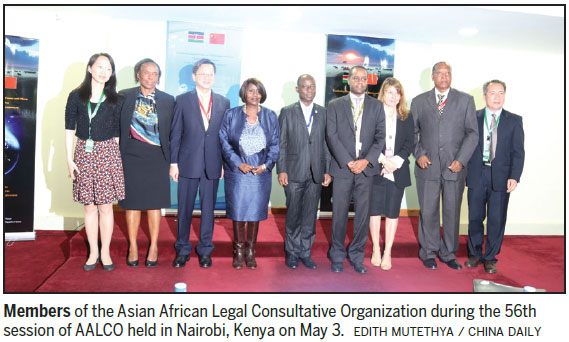New crackdown on illegal wildlife trade
Countries in Asia and Africa are committed to stepping up efforts to combat the illegal trade in wildlife and plants.
During the recent 56th session of the Asian African Legal Consultative Organization in Nairobi, Kenya, member countries said that the fight against the illegal wildlife trade is a global concern and needs comprehensive and concerted efforts.
Xu Hong, director general of China's Department of Treaty and Law, says combating the issue cannot be dealt with by a single country but needs the joint efforts of global, regional and national partners.

"Conservation of endangered wildlife species and combating illegal trade are common concerns and a grave challenge faced by the international community, which are complicated and require comprehensive solutions," he says.
Noting that most Asian and African countries are keenly focusing on wildlife conservation and combating illegal trade, Hong says there is an urgent need to enhance capacity building and cooperation, and share experiences among members.
"As the only intergovernmental organization across Asia and Africa for consulting and cooperation on international law, AALCO could be a valuable forum for members to further exchange views and deepen understanding of the issue from legal, technical and administrative perspectives," says Hong.
The same sentiments are shared by Judi Wakhungu, Kenyan cabinet secretary for Environment and Natural Resources, who says the prevention and combating of illegal trade in wildlife and wildlife products should be a primary concern of the global community, as it undermines security across nations.
"As a global community, we need to enhance local, regional and international cooperation in order to guarantee the security of our natural heritage and our citizens," she says.
Meng Xianlin, director general of the Confederation of International Trade in Endangered Species in China, says international cooperation is imperative in the fight against wildlife trafficking.
"While the first response for any nation should be its national wildlife conservation, cooperation and coordination are needed in order to achieve tangible results," he says.
Julie Thomson, head of East Africa office of the Wildlife Trade Monitoring Network, says there is a need for collaboration on law enforcement training and data management.
"Working together is the only way that we will be able to address illegal wildlife trafficking," she says.
Focusing on law enforcement, creating public awareness and data collection can play a critical role, she says.
Wakhungu says Kenya is implementing an ivory trade action plan to reduce poaching and trafficking.
The objective of the action plan is to enhance co-operation among states and non-state agencies to ensure elephant poaching and the illegal trade in elephant ivory is considerably reduced.
Tanzanian Minister for Justice and Constitutional Affairs Palamagamba Kabudi says his country is working closely with other East African countries to ensure that illegal trafficking of wildlife is eliminated.
"At a national level, we are making the public aware that wildlife protection and conservation is for their own economic benefit. We are also members of the Lusaka Agreement, where we cooperate to make sure that illegal wildlife trafficking is eliminated.
edithmutethya@chinadaily.com.cn


















